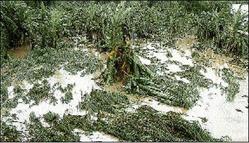Damion Mitchell, Assistant News Editor

A section of the St Mary Banana Estate that was swamped by Tropical Storm Gustav's torrential rains in August. The majority of Jamaica's banana sector was wiped out by the storm. - File
KINGSTOWN, St Vincent:
THE 2008 Caribbean Week of Agriculture opened in St Vincent and the Grenadines Monday with more concerns about the future of the sector.
During the official welcome ceremony, speaker after speaker forecast more difficulties for the region because of the decline in agricultural production and the unravelling United States (US) financial crisis.
But it was Montgomery Daniel, the agriculture minister for St Vincent and the Grenadines, who was most profound. He said this was the most challenging time for the sector.
Fewer visitors, less produce
Daniel said the Caribbean was already grappling with preferential price cuts and noted that hurricane-recovery efforts must deal with the effects of the US meltdown.
This could mean less agricultural production in the region, because visitor arrivals from the US will be cut; and less agricultural production means less money for farmers to support their families, especially in communities where some industries are already limping.
"Banana, which was at one time green gold, is fighting desperately to maintain a position of silver," Daniel said.
"In its heyday, the industry brought well over EC$370 million to our farmers and economies. today, the industry is generating just over EC$100 million."
Jamaica most recently indicated that it would be pulling of out the banana export business as it is becoming too costly to resuscitate after storms. Already, St Lucia has significantly cut its banana production.
Pleased with response
But Irwin Larocque, assistant secretary-general of the Caribbean Community, says he was satisfied with the region's response efforts to the current agricultural challenges.
"I think we are responding to our particular crisis in our own region," he said. "With or without the US crisis, we must do this and I think we are making strides forward."
However, several delegates attending a workshop later in the afternoon had a different story. They also expressed frustration that farmers and other stakeholders at the lower level of the industry were being ignored in the formation of policies, which were later imposed on them.


